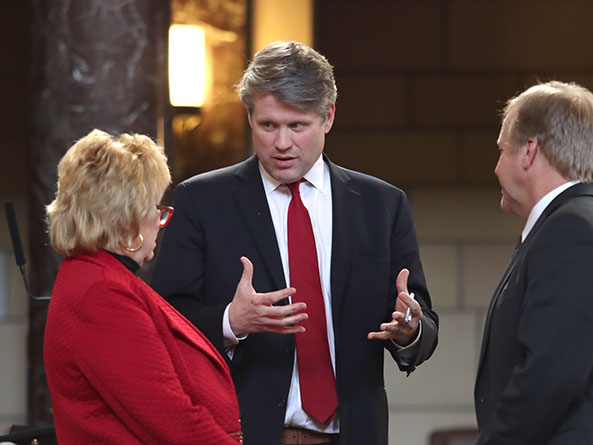Pandemic funding bill clears second round
Lawmakers amended and advanced a bill March 28 that would appropriate the $1.04 billion allocated to Nebraska from federal pandemic relief funds after approving several amendments that made minor modifications to individual allocations within the proposal.
LB1014, introduced by Speaker Mike Hilgers of Lincoln at the request of Gov. Pete Ricketts, contains recommended appropriations for fiscal year 2021-22 and FY2022-23 for the American Rescue Plan Act funds that Nebraska has been allocated to mitigate the impact of the coronavirus pandemic.
The state has received $520 million and an additional $520 million is anticipated by May 2022. Federal law specifies that expenditures must either support COVID-19 mitigation efforts, respond to negative economic impacts, replace lost revenue, provide premium pay for essential workers or fund water, sewer and broadband infrastructure projects.
The federal funds must be allocated within three years and spent within five years.
Gering Sen. John Stinner offered an amendment during select file debate, adopted 26-7, which would allocate $4 million to the state Department of Health and Human Services to contract with a statewide nonprofit to increase child care capacity in areas of need by providing grants to start or expand programs for children from birth through age five. The provisions originally were introduced in Albion Sen. Tom Briese’s LB1203.
Stinner said many child care providers closed down during the pandemic, exacerbating an existing shortage. Funds would be offset by lowering the allocation in LB1014 for rural workforce housing by $4 million.
“Parents who need and are willing to work should not have to choose between their jobs and caring for children,” Stinner said. “In approximately 64 of Nebraska’s 93 counties, more than 25 percent of residents don’t have reasonable access to child care within driving distance.”
North Platte Sen. Mike Jacobson spoke in support of the amendment, noting the importance of both affordable housing and child care in pandemic recovery.
“Everything is interrelated,” he said. “And when you start looking at economic development in a community it’s not one thing, it’s a combination of things, and it’s that proverbial weak link in the chain that breaks the chain.”
Elkhorn Sen. Lou Ann Linehan offered two amendments during select file debate to place limitations on entities receiving funds under LB1014. The first, adopted 32-0, would cap administrative expenditures at 15 percent for any agency, board or commission that receives ARPA dollars from the state through the bill.
The second, adopted 31-0, would prohibit funds appropriated in the bill from being used by or for a joint public agency. Linehan said that in the past political subdivisions that have held failed bond elections have formed JPAs to allow them to use another entity’s levy authority without a vote of the people.
She said the amendment would prevent “a JPA spring, where they’re popping up everywhere.”
Also offering an amendment on select file was Lincoln Sen. Adam Morfeld. The amendment, adopted 27-5, added provisions of his LB867, which would provide $500,000 for HIV Surveillance and Prevention Program.
Morfled said the program, which is administered by DHHS, provides access to education and pre-exposure medication for individuals at high risk of getting HIV. Many Nebraskans who could benefit from services are unaware that the program exists, he said.
The funds would be offset by taking $500,000 from the $47 million allocated to the state Department of Economic Development for community and rural development.
After four hours of debate, Stinner offered a motion to invoke cloture, which ceases debate and forces a vote on the bill and any pending amendments. The motion was adopted on a 34-4 vote. Thirty-three votes were needed.
Following the adoption of two additional technical amendments, lawmakers advanced LB1014 to final reading on a 33-7 vote.


